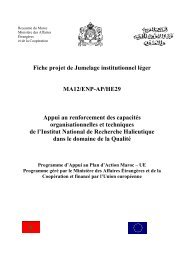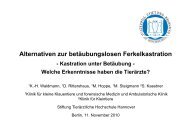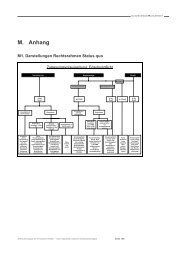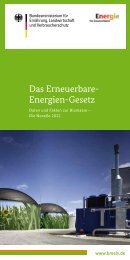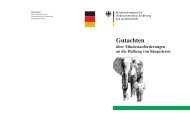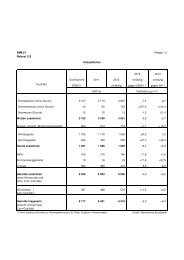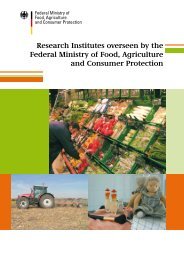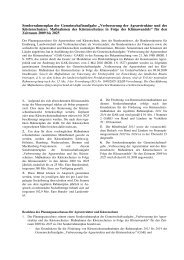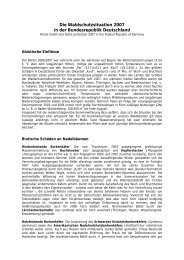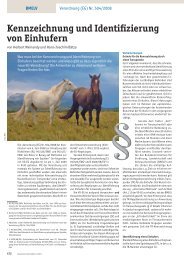The Federal Ministry of Food, Agriculture and Consumer ... - BMELV
The Federal Ministry of Food, Agriculture and Consumer ... - BMELV
The Federal Ministry of Food, Agriculture and Consumer ... - BMELV
Create successful ePaper yourself
Turn your PDF publications into a flip-book with our unique Google optimized e-Paper software.
<strong>Federal</strong> <strong>Ministry</strong> <strong>of</strong><br />
<strong>Food</strong>, <strong>Agriculture</strong><br />
<strong>and</strong> <strong>Consumer</strong> Protection<br />
<strong>The</strong> <strong>Federal</strong> <strong>Ministry</strong><br />
<strong>of</strong> <strong>Food</strong>, <strong>Agriculture</strong><br />
<strong>and</strong> <strong>Consumer</strong> Protection<br />
www.bmelv.de
2 3 <strong>The</strong> <strong>BMELV</strong><br />
Dear Readers,<br />
<strong>Food</strong>, agriculture <strong>and</strong> consumer protection are core areas for<br />
action that are <strong>of</strong> decisive importance for the future <strong>of</strong> our<br />
society.<br />
<strong>Consumer</strong>s in Germany want to have a wide range <strong>of</strong> high<br />
quality <strong>and</strong> healthy foods at their disposal. In addition, the<br />
safety <strong>of</strong> our foods may not be a question <strong>of</strong> price. <strong>The</strong>refore<br />
high st<strong>and</strong>ards need to be complied with on the way from the<br />
field to the fork here <strong>and</strong> in the entire European Union.<br />
Rural areas make up around two-thirds <strong>of</strong> Germany‘s territory.<br />
It is our job to keep rural regions in top form for the challenges<br />
<strong>of</strong> the future: using l<strong>and</strong> in a manner that is compatible with<br />
nature <strong>and</strong> ecology, dealing with demographic change, securing<br />
jobs <strong>and</strong> nationwide Internet access are urgent issues that<br />
call for new ideas.<br />
Our agricultural sector should continue to be firmly anchored<br />
at the core <strong>of</strong> society. Farmers ensure our nourishment, care for<br />
our unique cultural l<strong>and</strong>scapes <strong>and</strong> create jobs outside <strong>of</strong> major<br />
conurbations. Renewable resources <strong>of</strong>fer great potential, both<br />
as raw products for industry <strong>and</strong> also as an energy source <strong>of</strong> the<br />
future. My <strong>Ministry</strong>‘s policies also provide the forestry <strong>and</strong> fishery<br />
sectors with the best possible framework to meet the challenges<br />
<strong>of</strong> the future.<br />
Our foods are valuable <strong>and</strong> too good for the bin. Even so,<br />
there is far too much food waste in Germany. In cooperation<br />
with consumers, producers, distributors, large-scale consumers<br />
<strong>and</strong> actors <strong>of</strong> civil society, we are developing strategies<br />
against this waste.
<strong>The</strong> <strong>BMELV</strong> 3<br />
<strong>Consumer</strong>s today are <strong>of</strong>fered an ever-broader range <strong>of</strong> goods<br />
<strong>and</strong> services. This also means that it is becoming more difficult<br />
to find one‘s way around the variety <strong>of</strong> products. Here we provide<br />
consumers with information, advice <strong>and</strong> support.<br />
We protect consumers against hazards, increase transparency<br />
<strong>and</strong> strengthen their rights. This relates to everything from<br />
foods to financial products to the Internet.<br />
As you can see, our field <strong>of</strong> work is very broad <strong>and</strong> our commitments<br />
are diverse. In this brochure I would like to give you<br />
an outline <strong>of</strong> the <strong>Ministry</strong>‘s areas <strong>of</strong> activity <strong>and</strong> <strong>of</strong> our policy<br />
aims.<br />
If you wish to find out more about the work <strong>of</strong> the <strong>Federal</strong><br />
<strong>Ministry</strong> <strong>of</strong> <strong>Food</strong>, <strong>Agriculture</strong> <strong>and</strong> <strong>Consumer</strong> Protection <strong>and</strong><br />
current issues within our remit please visit our website<br />
www.bmelv.de.<br />
Yours sincerely,<br />
Ilse Aigner<br />
<strong>Federal</strong> Minister <strong>of</strong> <strong>Food</strong>, <strong>Agriculture</strong><br />
<strong>and</strong> <strong>Consumer</strong> Protection
4 5 <strong>The</strong> <strong>BMELV</strong>
Contents<br />
<strong>The</strong> <strong>BMELV</strong> 5<br />
<strong>Food</strong> 6<br />
<strong>Agriculture</strong> <strong>and</strong> Rural Areas 10<br />
Strong <strong>and</strong> Sustainable Rural Areas<br />
in Germany 12<br />
<strong>Agriculture</strong> 12<br />
Forestry 14<br />
Fisheries 14<br />
<strong>Consumer</strong> Protection 16<br />
<strong>Food</strong> Safety 18<br />
Strengthening the Position <strong>of</strong><br />
<strong>Consumer</strong>s 19<br />
International Affairs 20<br />
<strong>The</strong> <strong>Ministry</strong> 24<br />
Visitors' Service 28
6 7 <strong>The</strong> <strong>BMELV</strong><br />
<strong>Food</strong>
<strong>The</strong> <strong>BMELV</strong> 7
8 9 <strong>The</strong> <strong>BMELV</strong><br />
<strong>The</strong> German food industry is one <strong>of</strong> our country’s most innovative<br />
<strong>and</strong> productive economic sectors. “Made in Germany”<br />
st<strong>and</strong>s for internationally acclaimed quality <strong>and</strong> for a huge variety<br />
in terms <strong>of</strong> the products on <strong>of</strong>fer, particularly in the food<br />
sector. Almost five million people are employed by the German<br />
agricultural <strong>and</strong> food industries. <strong>The</strong>y contribute a share <strong>of</strong><br />
seven percent to our economic strength.<br />
<strong>The</strong> <strong>Federal</strong> Government’s aim is to balance consumer dem<strong>and</strong>s<br />
for high-quality foods with the economic interests <strong>of</strong><br />
producers <strong>and</strong> the retail sector. <strong>Food</strong> safety is always the top<br />
priority in this regard in terms <strong>of</strong> precautionary consumer<br />
protection.
<strong>The</strong> <strong>BMELV</strong> 9<br />
What we eat <strong>and</strong> drink also has an influence on our well-being<br />
<strong>and</strong> physical <strong>and</strong> mental abilities. <strong>Food</strong> is also part <strong>of</strong> our culture,<br />
however: joint meals serve as a meeting place <strong>and</strong> provide<br />
an opportunity for families <strong>and</strong> friends to hold conversations.<br />
<strong>The</strong>refore, the <strong>Federal</strong> <strong>Ministry</strong> <strong>of</strong> <strong>Food</strong>, <strong>Agriculture</strong> <strong>and</strong><br />
<strong>Consumer</strong> Protection (<strong>BMELV</strong>) encourages people to enjoy a<br />
healthy diet by promoting safe <strong>and</strong> prime quality foodstuffs.<br />
This includes conveying information about the basic principles<br />
for a healthy diet, which is promoted for example via the<br />
National Action Plan scheduled to run until 2020 “IN FORM –<br />
German national initiative to promote healthy diets <strong>and</strong> physical<br />
activity”.
10 11 <strong>The</strong> <strong>BMELV</strong><br />
<strong>Agriculture</strong> <strong>and</strong><br />
Rural Areas
<strong>The</strong> <strong>BMELV</strong> 11
12 13 <strong>The</strong> <strong>BMELV</strong><br />
Strong <strong>and</strong> Sustainable Rural Areas in Germany<br />
Rural areas make up around two-thirds <strong>of</strong> Germany’s national<br />
territory. About 70 percent <strong>of</strong> the population live outside major<br />
cities; more than three quarters <strong>of</strong> all municipalities have fewer<br />
than 5,000 inhabitants. <strong>The</strong> countryside is full <strong>of</strong> appealing <strong>and</strong><br />
growing regions. However, some parts <strong>of</strong> the population live<br />
in structurally weaker areas that are confronted with high unemployment,<br />
the exodus <strong>of</strong> the younger generation <strong>and</strong> demographic<br />
aging <strong>of</strong> the local population. This calls for new ideas<br />
in order to supplement tried-<strong>and</strong>-tested concepts, such as promoting<br />
additional income alternatives. <strong>The</strong> <strong>Federal</strong> <strong>Ministry</strong>’s<br />
aim is to maintain the diversity <strong>of</strong> rural areas, to boost their<br />
strengths <strong>and</strong> economic power <strong>and</strong> to support social cohesion<br />
through voluntary commitment.<br />
<strong>Agriculture</strong><br />
Together with our forests, Germany’s l<strong>and</strong>scape is characterised<br />
by arable l<strong>and</strong>, meadows <strong>and</strong> pasture l<strong>and</strong>. Farmers manage<br />
more than half <strong>of</strong> the total national territory. Around<br />
1.1 million people are currently working full-time or parttime<br />
in approximately 300,000 agricultural holdings <strong>and</strong> about<br />
40,000 young people are being trained in green occupations.<br />
This makes agriculture an important employer – yesterday, today<br />
<strong>and</strong> tomorrow.<br />
Germany’s agriculture is characterised by great variety in terms<br />
<strong>of</strong> natural conditions, the different sizes <strong>and</strong> organisational<br />
structures <strong>of</strong> agricultural holdings, the various production<br />
methods used <strong>and</strong> the abundance <strong>of</strong> regional foods <strong>and</strong> raw
<strong>The</strong> <strong>BMELV</strong> 13<br />
products available. Sustainable agriculture <strong>and</strong> forestry are the<br />
prerequisites for protecting our natural resources – soil, water<br />
<strong>and</strong> air – <strong>and</strong> for maintaining biological diversity. Protecting<br />
these natural resources <strong>and</strong> welfare-orientated husb<strong>and</strong>ry <strong>of</strong><br />
farm animals are special concerns <strong>of</strong> the <strong>Ministry</strong>. We also devote<br />
a great deal <strong>of</strong> attention to ensuring that green genetic<br />
engineering is conducted responsibly.<br />
<strong>The</strong> production <strong>of</strong> high-quality foods is a major task for the<br />
agricultural sector because dem<strong>and</strong> continues to rise due to a<br />
growing world population <strong>and</strong> the increasing desire for highquality<br />
products such as meat, milk, fruit <strong>and</strong> vegetables.<br />
Yet, today’s farmers are also increasingly involved in growing<br />
energy. Against the backdrop <strong>of</strong> the EU’s <strong>and</strong> Germany’s ambitious<br />
policy objectives in climate <strong>and</strong> resource protection <strong>and</strong><br />
in view <strong>of</strong> rising energy prices, the sustainable use <strong>of</strong> regenerative<br />
sources <strong>of</strong> energy provides additional opportunities. <strong>The</strong><br />
domestic agricultural sector is now a major producer <strong>of</strong> biomass<br />
for the production <strong>of</strong> electricity, heat <strong>and</strong> bi<strong>of</strong>uels. <strong>The</strong>re<br />
is also a dem<strong>and</strong> for renewable resources as materials <strong>and</strong> for<br />
uses in the chemical industry. Around two million hectares <strong>of</strong><br />
arable l<strong>and</strong> are currently used in Germany for the cultivation <strong>of</strong><br />
renewable resources. This enables us to tap innovative potential,<br />
to create jobs <strong>and</strong> to safeguard incomes in rural areas.<br />
<strong>The</strong> <strong>Federal</strong> <strong>Ministry</strong>’s aim is to create optimal conditions to<br />
enable the German agricultural industry to be modern, multifunctional<br />
<strong>and</strong> innovative. <strong>The</strong> <strong>BMELV</strong> has initiated a broad social<br />
dialogue on the future tasks <strong>of</strong> the agri-food sector in Germany.<br />
Based on the results <strong>of</strong> this debate, the <strong>BMELV</strong> presented<br />
the “Charter for <strong>Agriculture</strong> <strong>and</strong> <strong>Consumer</strong>s” in early 2012. In<br />
five areas <strong>of</strong> action, the Charter describes important measures<br />
for the future structuring <strong>of</strong> German food <strong>and</strong> agricultural policy,<br />
also taking account <strong>of</strong> consumer expectations.<br />
<strong>The</strong> <strong>Federal</strong> <strong>Ministry</strong> also advocates cutting red tape. In addition<br />
to this, agricultural social security policy supports the<br />
social security <strong>of</strong> self-employed farmers by providing a special<br />
system adapted to the farming pr<strong>of</strong>ession. Hence, agricultural<br />
social policy is a practised element <strong>of</strong> our Social Market<br />
Economy.
14 15 <strong>The</strong> <strong>BMELV</strong><br />
Forestry<br />
One third <strong>of</strong> Germany is covered in forests. Over two million<br />
forest owners in Germany are responsible for the sustainable<br />
management <strong>of</strong> the forests. Forests play a very important role<br />
as complex ecosystems that improve the air, water <strong>and</strong> the climate,<br />
as a habitat for a variety <strong>of</strong> flora <strong>and</strong> fauna, <strong>and</strong> in providing<br />
people with a highly valued environment in which to<br />
relax, move around <strong>and</strong> enjoy nature. <strong>The</strong> forests also supply<br />
wood, an environmentally friendly raw material. <strong>The</strong> use <strong>of</strong> domestic<br />
species <strong>of</strong> wood remains an important prerequisite for<br />
enabling our forests to be managed sustainably. Wood is also<br />
increasingly being used for energy generation. Forestry is also<br />
an important employer. Around 1.2 million people work in forestry<br />
<strong>and</strong> forest-based industries.<br />
<strong>The</strong> <strong>Federal</strong> <strong>Ministry</strong> is supporting efforts to exp<strong>and</strong> the use <strong>of</strong><br />
wood, to encourage sustainable forest management <strong>and</strong> to preserve<br />
forest biological diversity.<br />
Fisheries<br />
Fishing is a traditional industry in the coastal regions <strong>of</strong> Germany<br />
<strong>and</strong> also in some inl<strong>and</strong> areas. It shapes the life, culture<br />
<strong>and</strong> tourism <strong>of</strong> these areas. <strong>The</strong> more than 40,000 people<br />
who are employed in this sector provide consumers with over<br />
1.2 million metric tons <strong>of</strong> high-quality fishery products from<br />
the sea <strong>and</strong> inl<strong>and</strong> waters each year.<br />
Sustainable use <strong>of</strong> our global fish stocks is more important today<br />
than ever before, so that future generations can also be<br />
supplied with fish, a high-quality <strong>and</strong> healthy food. <strong>The</strong> <strong>Ministry</strong><br />
therefore advocates a fundamental realignment <strong>of</strong> the<br />
Common Fisheries Policy. Many fish stocks in EU waters <strong>and</strong><br />
around the world are still in poor condition. Sustainable fisheries<br />
means first <strong>and</strong> foremost aligning the catch capacities to<br />
existing fishing possibilities <strong>and</strong> this has already been imple-
<strong>The</strong> <strong>BMELV</strong> 15<br />
mented in Germany. Furthermore, a modern form <strong>of</strong> fisheries<br />
management must be evolved. <strong>The</strong> introduction <strong>of</strong> bans on<br />
discards <strong>and</strong> l<strong>and</strong>ing obligations are decisive for this in order to<br />
avoid undesired by-catches as far as possible <strong>and</strong> to put an end<br />
to the irresponsible waste <strong>of</strong> ocean resources. <strong>The</strong>se measures<br />
must be accompanied by effective fishery controls <strong>and</strong> forceful<br />
abatement <strong>of</strong> illegal fishing so that the consumers’ trust can<br />
be regained. <strong>The</strong> <strong>Federal</strong> Government expressly supports the<br />
introduction <strong>of</strong> certification systems for sustainable fisheries,<br />
such as the Marine Stewardship Council.<br />
Alongside sea fisheries, inl<strong>and</strong> fishing (including aquaculture)<br />
also plays an important role for the fishing industry as there are<br />
more than 1,000 full-time enterprises <strong>and</strong> almost 20,000 parttime<br />
enterprises engaged in this sector. Eighty percent <strong>of</strong> the<br />
fish produced here comes from aquaculture, the fishing sector<br />
with the greatest potential for growth. Twenty percent is supplied<br />
by traditional river <strong>and</strong> lake fisheries. In addition to pr<strong>of</strong>essional<br />
fishermen, more than 1.5 million recreational fishermen<br />
use <strong>and</strong> manage Germany’s water bodies.
16 17 <strong>The</strong> <strong>BMELV</strong><br />
<strong>Consumer</strong> Protection
<strong>The</strong> <strong>BMELV</strong> 17
18 19 <strong>The</strong> <strong>BMELV</strong><br />
<strong>Food</strong> Safety<br />
Protecting health through safe, high-quality foods is an important<br />
task for the <strong>Ministry</strong>. New products <strong>and</strong> ingredients<br />
that enter the market must, like all products in the production<br />
chains, adhere to high st<strong>and</strong>ards. On principle, preventive consumer<br />
protection has priority over economic interests.<br />
<strong>Food</strong>s are increasingly being traded on a global scale, therefore<br />
there is a Europe-wide <strong>and</strong> internationally aligned system that<br />
guarantees food safety. <strong>The</strong> <strong>BMELV</strong> <strong>and</strong> its authorities ensure<br />
that risks are continuously assessed <strong>and</strong> that the st<strong>and</strong>ards <strong>and</strong><br />
structures are brought into line with new findings in close cooperation<br />
with the <strong>Federal</strong> States. <strong>The</strong>ir job is to monitor foods<br />
<strong>and</strong> the market.<br />
<strong>The</strong> <strong>Federal</strong> <strong>Ministry</strong> forcefully advocates transparent labelling<br />
<strong>of</strong> foods that prevents deception <strong>and</strong> fraud <strong>and</strong> serves as an important<br />
decision-making aid for consumers.
Strengthening the Position <strong>of</strong> <strong>Consumer</strong>s<br />
<strong>The</strong> <strong>BMELV</strong> 19<br />
<strong>Consumer</strong> policy ensures safety <strong>and</strong> self-determination in order<br />
to enable consumers to shape their consumer behaviour<br />
themselves in our complex economy. This requires a regulatory<br />
framework that strengthens the market position <strong>of</strong> consumers,<br />
protects their health <strong>and</strong> prohibits deception <strong>and</strong> fraud.<br />
Other issues <strong>of</strong> great concern to the <strong>Federal</strong> <strong>Ministry</strong> <strong>of</strong> <strong>Consumer</strong><br />
Protection are adequate consumer information <strong>and</strong> the<br />
strengthening <strong>of</strong> everyday competencies, particularly <strong>of</strong> young<br />
people.<br />
If consumers can rely on being protected <strong>and</strong> are provided<br />
with credible information, they can develop trust in products<br />
<strong>and</strong> markets. This trust will prompt <strong>and</strong> influence purchasing<br />
decisions. <strong>The</strong> purchasing decisions will, in turn, contribute to<br />
controlling the market. <strong>Consumer</strong> policy is economic policy<br />
seen from the dem<strong>and</strong> side.<br />
In the energy or telecommunications sector, consumers can already<br />
choose between competing <strong>of</strong>fers. In many areas <strong>of</strong> consumption,<br />
Internet trade has complemented or replaced traditional<br />
forms <strong>of</strong> shopping. Individual responsibility <strong>and</strong> private<br />
pension plans for the old age, nursing <strong>and</strong> healthcare sector are<br />
becoming increasingly important. <strong>The</strong>se are important consumer<br />
policy challenges that the <strong>Federal</strong> <strong>Ministry</strong> <strong>of</strong> <strong>Consumer</strong><br />
Protection is ready to face.
20 21 <strong>The</strong> <strong>BMELV</strong><br />
International Affairs
<strong>The</strong> <strong>BMELV</strong> 21
22 23 <strong>The</strong> <strong>BMELV</strong><br />
In our globalised world, we can no longer shape policy issues<br />
only with regard to Germany. This also applies to the <strong>BMELV</strong>’s<br />
field <strong>of</strong> activities, for instance with regard to European Union<br />
decisions on agriculture <strong>and</strong> fisheries, consumer policy <strong>and</strong><br />
food.<br />
<strong>The</strong>refore, the <strong>BMELV</strong> actively represents German interests<br />
within the European Union <strong>and</strong> the responsible multilateral<br />
organisations. <strong>The</strong> <strong>BMELV</strong> also performs a multitude <strong>of</strong> tasks<br />
related to issues <strong>of</strong> international cooperation. Here, the focus is<br />
on key issues such as the global food situation <strong>and</strong> climate protection,<br />
the dismantling <strong>of</strong> barriers in international trade, the<br />
maintenance <strong>of</strong> existing markets, the opening up <strong>of</strong> new markets<br />
<strong>and</strong>, not least, good bilateral relations with states on all<br />
continents.
<strong>The</strong> <strong>BMELV</strong> 23<br />
<strong>The</strong> <strong>Ministry</strong> furthermore promotes political cooperation with<br />
third countries <strong>and</strong> international organisations by implementing<br />
numerous projects, which also contribute to improving<br />
global food security through practical measures. <strong>The</strong> Global<br />
Forum for <strong>Food</strong> <strong>and</strong> <strong>Agriculture</strong> (GFFA), which took part alongside<br />
the International Green Week in Berlin, also was able to<br />
establish an internationally unique platform <strong>of</strong> agricultural<br />
ministers from around the world to deal with world food issues.<br />
At the global level, Germany is the third largest exporter <strong>of</strong><br />
agricultural <strong>and</strong> food products. Today, the sector earns every<br />
fourth euro abroad. <strong>The</strong> <strong>Ministry</strong> supports the export activities<br />
<strong>of</strong> companies operating in the agricultural <strong>and</strong> food sectors,<br />
e.g. by participating in trade fairs, market studies, trade missions<br />
<strong>and</strong> export events.
24 25 <strong>The</strong> <strong>BMELV</strong><br />
<strong>The</strong> <strong>Ministry</strong><br />
Berlin Office
Bonn Office<br />
<strong>The</strong> <strong>BMELV</strong> 25
26 27 <strong>The</strong> <strong>BMELV</strong><br />
<strong>Federal</strong> Minister<br />
Ilse Aigner<br />
Parliamentary State Secretary<br />
Peter Bleser<br />
Within the <strong>Federal</strong> Government, <strong>Federal</strong> Minister Ilse Aigner is<br />
responsible for structuring German food, agricultural <strong>and</strong> consumer<br />
policy <strong>and</strong> campaigns for these objectives <strong>and</strong> issues.<br />
She has been leading the <strong>BMELV</strong> since 31 October 2008.<br />
<strong>The</strong> Parliamentary State Secretaries Peter Bleser <strong>and</strong> Dr. Gerd<br />
Müller are in charge <strong>of</strong> the exchange <strong>of</strong> information between<br />
government <strong>and</strong> parliament. <strong>The</strong>y represent the <strong>Federal</strong> Minister<br />
politically in the German Bundestag, the Bundesrat <strong>and</strong> the<br />
parliamentary groups.<br />
<strong>The</strong> Permanent State Secretary Dr. Robert Kloos represents<br />
the <strong>Federal</strong> Minister at the top level <strong>of</strong> the <strong>Ministry</strong>. As head <strong>of</strong><br />
administration he is responsible for more than 900 members<br />
<strong>of</strong> staff at the <strong>BMELV</strong> in Bonn <strong>and</strong> Berlin. In addition, <strong>BMELV</strong><br />
members <strong>of</strong> staff are seconded to German embassies <strong>and</strong> representations<br />
on all continents.<br />
<strong>The</strong> <strong>BMELV</strong> receives expert assistance in decisions for its food,<br />
agricultural, forestry, fisheries <strong>and</strong> consumer policies <strong>and</strong> the<br />
development <strong>of</strong> rural regions from its departmental researchers.<br />
<strong>The</strong> promotion <strong>of</strong> research <strong>and</strong> innovation are decisive<br />
prerequisites for solving problems <strong>of</strong> the future.
Parliamentary State Secretary<br />
Dr. Gerd Müller<br />
<strong>The</strong> <strong>BMELV</strong> 27<br />
State Secretary<br />
Dr. Robert Kloos<br />
<strong>The</strong> institutions with approximately 5,000 staff members<br />
working within the <strong>BMELV</strong>’s sphere <strong>of</strong> operations comprise<br />
Y higher federal authorities (<strong>Federal</strong> Office <strong>of</strong> <strong>Consumer</strong><br />
Protection <strong>and</strong> <strong>Food</strong> Safety [BVL]; <strong>Federal</strong> Office <strong>of</strong> Plant<br />
Varieties [BSA]),<br />
Y legally independent institutions (<strong>Federal</strong> Institute for Risk<br />
Assessment [BfR], <strong>Federal</strong> Agency for <strong>Agriculture</strong> <strong>and</strong> <strong>Food</strong><br />
[BLE], German wine fund),<br />
Y four federal research centres (Julius Kühn Institute – <strong>Federal</strong><br />
Research Centre for Cultivated Plants [JKI]; Friedrich Loeffler<br />
Institute – <strong>Federal</strong> Research Institute for Animal Health<br />
[FLI]; Max Rubner Institute – <strong>Federal</strong> Research Institute for<br />
Nutrition <strong>and</strong> <strong>Food</strong> [MRI] <strong>and</strong> Johann Heinrich von Thünen<br />
Institute – <strong>Federal</strong> Research Institute for Rural Areas, Forestries<br />
<strong>and</strong> Fisheries [vTI],<br />
Y recipients <strong>of</strong> institutional grants (e.g. German Biomass<br />
Research Centre [DBFZ]).<br />
<strong>The</strong> <strong>BMELV</strong> responds to questions from citizens about its fields<br />
<strong>of</strong> activity in writing via letter or e-mail.<br />
It has also joined the information network with the uniform<br />
<strong>of</strong>ficial telephone number 115.
28 29 <strong>The</strong> <strong>BMELV</strong>
Visitors' Service<br />
Welcome to the <strong>BMELV</strong>!<br />
<strong>The</strong> <strong>BMELV</strong> 29<br />
Y <strong>The</strong> <strong>BMELV</strong> invites organised groups to visit its Berlin <strong>and</strong> Bonn<br />
<strong>of</strong>fices.<br />
Come <strong>and</strong> learn about the tasks <strong>and</strong> working practices <strong>of</strong> the<br />
<strong>Ministry</strong> <strong>and</strong> discuss political issues <strong>of</strong> interest to you with our staff.<br />
Registration<br />
by phone: ++49 / (0)30 / 18529 - 3183<br />
by e-mail: besucherdienst@bmelv.bund.de<br />
on the Internet: http://www.bmelv.deYMinisteriumY<br />
Besucherdienst
30 <strong>The</strong> <strong>BMELV</strong><br />
Notes
Imprint<br />
Published by<br />
<strong>Federal</strong> <strong>Ministry</strong> <strong>of</strong> <strong>Food</strong>,<br />
<strong>Agriculture</strong> <strong>and</strong> <strong>Consumer</strong> Protection (<strong>BMELV</strong>)<br />
Division for Public Relations, Internet<br />
Wilhelmstraße 54<br />
10117 Berlin<br />
Status<br />
June 2012<br />
Layout<br />
design.idee, büro_für_gestaltung, Erfurt<br />
Photographs<br />
<strong>BMELV</strong>, <strong>BMELV</strong>/Bildschön, <strong>BMELV</strong>/ Dominik Reipka; <strong>BMELV</strong>/<br />
Walkscreen, Bundesregierung/Kugler, www.oekol<strong>and</strong>bau.de, BLE,<br />
Bonn/Photographs: Thomas Stephan, Getty Images, Kerstin Bänsch,<br />
Ursula Böhmer, Frank Ossenbrink<br />
Printed by<br />
<strong>BMELV</strong><br />
Ordering Information<br />
You can order this <strong>and</strong> other publications free <strong>of</strong> charge:<br />
Internet: www.bmelv.de→Service→Publikationen<br />
E-mail: publikationen@bundesregierung.de<br />
Fax: ++49 / (0)1805-77 80 94<br />
(In Germany: fixed fee <strong>of</strong> 14 ct/min, fees from mobile<br />
phone networks or from abroad may vary)<br />
Phone: ++49 / (0)1805-77 80 90<br />
(In Germany: fixed fee <strong>of</strong> 14 ct/min, fees from mobile<br />
phone networks or from abroad may vary)<br />
By mail: Publikationsvers<strong>and</strong> der Bundesregierung<br />
Postfach 48 10 09 | D-18132 Rostock<br />
This brochure is published as part <strong>of</strong> the public relations activities<br />
<strong>of</strong> the <strong>Federal</strong> Government. It may not be used by political parties<br />
or groups for electioneering purposes during an election campaign.<br />
For further information please go to:<br />
www.bmelv.de<br />
<strong>The</strong> <strong>BMELV</strong> is certified as<br />
a family-friendly employer



